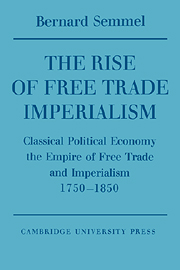 The Rise of Free Trade Imperialism
The Rise of Free Trade Imperialism Book contents
- Frontmatter
- Contents
- Preface
- 1 Introduction
- 2 Theory and politics of Free Trade Empire in the eighteenth century
- 3 The agrarian critique and the emergence of orthodoxy
- 4 The third school: Wakefield and the Radical economists
- 5 The Wakefield program for middle-class empire
- 6 Parliament, political economy, and the Workshop of the World
- 7 Cobdenism and the ‘dismal science’
- 8 Mercantilist revival
- 9 Classical political economy, the Empire of Free Trade, and imperialism
- Selected Bibliography
- Index
2 - Theory and politics of Free Trade Empire in the eighteenth century
Published online by Cambridge University Press: 23 October 2009
- Frontmatter
- Contents
- Preface
- 1 Introduction
- 2 Theory and politics of Free Trade Empire in the eighteenth century
- 3 The agrarian critique and the emergence of orthodoxy
- 4 The third school: Wakefield and the Radical economists
- 5 The Wakefield program for middle-class empire
- 6 Parliament, political economy, and the Workshop of the World
- 7 Cobdenism and the ‘dismal science’
- 8 Mercantilist revival
- 9 Classical political economy, the Empire of Free Trade, and imperialism
- Selected Bibliography
- Index
Summary
To understand Mr Pitt, one must understand one of the suppressed characters of English history, and that is Lord Shelburne … [who adopted] a plan of commercial freedom, the germ of which may be found in the long-maligned negotiations of Utrecht, but which were soon in time matured by all the economic science of Europe, in which he was a proficient … for the first time since the Revolution, [Pitt and Shelburne] introduced into modern debate the legitimate principles on which commerce should be conducted … The commercial treaties of '87 were struck in the same mint, and are notable as the first effort made by the English government to emancipate the country from the restrictive policy which had been introduced by the ‘glorious revolution’ … In ordinary times the pupil of Shelburne [Pitt] would have raised this country to a state of great material prosperity, and removed or avoided many of the anomalies which now perplex us; but he was not destined for ordinary times; and, though his capacity was vast and his spirit lofty, he had not that passionate and creative genius required by an age of revolution.
Benjamin Disraeli, Sybil (1845)Tucker (vs. Hume) on Free Trade Empire
In 1752, the philosopher, historian, and economist, David Hume, the pride of the Scottish Enlightenment, had argued in one of his tracts that, under conditions of free trade, wealth would be transferred from a richer to a poorer state until the riches of both states were equal. Hume may have had in mind the example of Spain whose American treasure had been drained through trade with the other European states in the sixteenth and seventeenth centuries.
- Type
- Chapter
- Information
- The Rise of Free Trade ImperialismClassical Political Economy the Empire of Free Trade and Imperialism 1750–1850, pp. 14 - 47Publisher: Cambridge University PressPrint publication year: 1970
- 1
- Cited by


